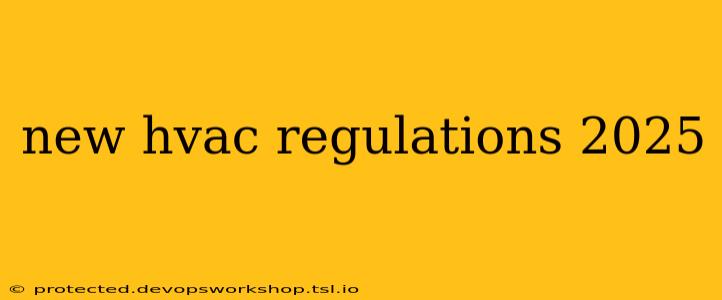The HVAC industry is undergoing a significant transformation, driven by increasing concerns about climate change and energy efficiency. 2025 marks a crucial year for many new regulations impacting heating, ventilation, and air conditioning systems. This comprehensive guide will break down the key changes you need to be aware of, whether you're a homeowner, contractor, or industry professional. Understanding these upcoming regulations is vital for making informed decisions about your HVAC systems and ensuring compliance.
Regional Variations: A Patchwork of Regulations
It's crucial to understand that HVAC regulations aren't uniform across the globe or even within a single country. The specific changes you'll encounter depend heavily on your location. Regulations vary significantly between states, provinces, and even municipalities. This makes it impossible to provide a single, universally applicable list of changes. Instead, this guide will highlight common trends and areas of focus emerging in many jurisdictions.
1. Increased Minimum Efficiency Standards (SEER/HSPF):
Many regions are raising the minimum Seasonal Energy Efficiency Ratio (SEER) for air conditioners and the Heating Seasonal Performance Factor (HSPF) for heat pumps. These ratings directly reflect the energy efficiency of the system. Higher SEER/HSPF ratings mean less energy consumption and lower operating costs. Expect stricter minimums in 2025 than in previous years, requiring consumers and installers to adopt more energy-efficient technologies. Checking your local building codes and utility company guidelines is crucial to determine the precise requirements in your area.
2. Refrigerant Regulations: The Phasedown of HFCs
Hydrofluorocarbons (HFCs), potent greenhouse gases, are increasingly subject to phase-down regulations under the American Innovation and Manufacturing Act (AIM Act). This federal legislation aims to significantly reduce HFC emissions over the coming years. 2025 is a key year in this process, with further restrictions on the production and import of certain HFCs. This means a shift towards more environmentally friendly refrigerants, such as hydrofluoroolefins (HFOs) and natural refrigerants like propane and CO2, is well underway. The transition will affect both new equipment and the servicing of existing systems.
3. Focus on Heat Pumps: A Growing Market
Heat pumps are gaining significant traction as a more efficient and environmentally friendly alternative to traditional heating systems, especially in areas suitable for their operation. Many jurisdictions are actively promoting heat pump adoption through incentives, rebates, and even stricter regulations favoring their installation in new constructions or renovations. Expect to see an increased emphasis on heat pump technology in 2025 and beyond. This includes stricter standards for their performance and potentially increased requirements for their use in certain building types.
4. Smart Technology and Data Collection
Increasingly, HVAC systems are incorporating smart technology, allowing for remote monitoring, control, and data collection on energy consumption. This data can be used to improve efficiency and maintenance scheduling. While not explicitly a regulation in all areas, the trend towards incorporating smart features is gaining momentum. Regulations may emerge in 2025 related to data security and privacy in these connected systems.
5. Enhanced Building Codes: A Holistic Approach
Many jurisdictions are revising their building codes to encompass the broader context of energy efficiency. This might mean stricter insulation requirements, improved ventilation strategies, and better building envelope design, all of which work synergistically with the HVAC system to optimize energy performance. Expect to see updated building codes in 2025 reflecting these integrated approaches to building energy efficiency.
Finding Your Local Regulations: A Practical Guide
To stay fully informed, you must consult the relevant authorities in your specific location. This typically involves:
- Your local building department: They will have the most up-to-date information on building codes and permit requirements.
- Your state/province energy office: They often provide information on incentives, rebates, and specific regulations related to energy efficiency.
- Your utility company: Many utilities offer programs to help homeowners upgrade to more efficient systems and may provide additional information on relevant regulations.
Staying informed about these evolving HVAC regulations is critical for compliance and leveraging the opportunities presented by new technologies. By understanding the changes and proactively adapting, you can ensure your HVAC systems are both efficient and environmentally responsible.

